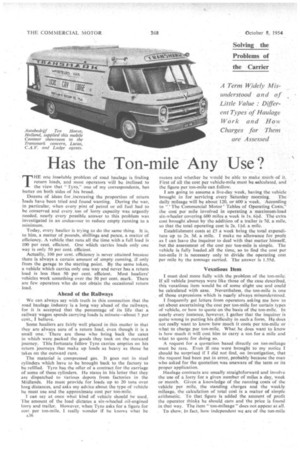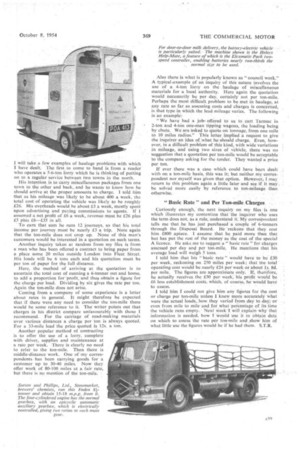Has the Ton-mile Any Use? .
Page 62

Page 65

If you've noticed an error in this article please click here to report it so we can fix it.
THE one Insoluble problem of road haulage is finding return loads, and most operators will be inclined to the view that "Tyro." one of my correspondents, has butter on both sides of his bread.
Dozens of ideas for_increasing the proportion of return loads have been tried and found wanting. During the war, in particular, when every pint of petrol or oil fuel had to be conserved and every. ton of lorry capacity was urgently needed, nearly every possible answer to this problem was investigated in an endeavour to reduce empty running to a minimum.
Today, every haulier is trying to do the same thing. It is, to him, a matter of pounds, shillings and pence, a matter of efficiency. A vehicle that runs all the time with a full load is 100 per cent. efficient. One which carries loads only one way is only 50 per cent. efficient.
Actually, 100 per cent, efficiency is never attained because there is always a certain amount of empty running, if only from the garage to the starting point. By the same token, a vehicle which carries only one way and never has a return load is less than 50 per cent. efficient. Most hauliers' vehicles work something over the 50 per cent. mark. There are few operators who do not obtain the occasional return load.
Ahead of the Railways
We can always say with truth in this connection that the road haulage industry is a long way ahead of the railways, for it is accepted that the percentage of its life that a railwat wagon spends carrying loads is minute—about 5 per cent., I believe.
Some hauliers are fairly well placed in this matter in that they are always sure of a return load, even though it is a small one.. There are those who bring back the cases in which were packed the goods they took on the outward journey. This fortunate. fellow Tyro carries empties on his return journeys that make up loads as heavy as those he takes on the outward runs.
The material is compressed gas. It goes out in steel cylinders which have to be brought back to the factory to be refilled. Tyro has the offer of a contract for the carriage of some of these cylinders. He states in his letter that they are dispatched to Various depots from factories in the Midlands. He must provide for loads up to 20 tons over long distances, and asks my advice about the type of vehicle he must use and the approximate cost per ton-mile.
I can say at once what kind of vehicle should be used. The amount of the load dictates a six-wheeled oil-engined lorry and trailer. However, when Tyro asks for a figure for cost per ton-mile. I really wonder if he knows what he means and whether he would be able to make nnich-of it. First of all the cost per vehicle-mile must be calculated. and the figure per ton-mile can follow.
I am going to assume a five-day week, having the vehicle
brought in for servicing every Saturday morning. The daily mileage will be about 120, or 600.a week. According to " ' The Commercial Motor' Tables of Operating Costs," the cost per mile involved in operating a maximum-load six-wheeler covering 600 miles a week is 1 s. 64d. The extra cost brought about by the addition of a trailer is 7d. a mile, so that the total operating cost is 2s. lid; a mile.
Establishment costs at £5 a week bring the total expenditure up to 2s. RI. a mile. 1 make no allowance for profit as I can leave the inquirer to deal with that matter himself, but the assessment of the cost per ton-mile is simple. The vehicle is fully loaded..all the time, so to find the cost per ton-mile it is necessary only to divide the operating cost per mile by the tonnage carried. The answer is 1.35d.
Vexatious Item I must deal more fully with the problem of the ton-mile: If all vehicle journeys were like those of the case described,
this vexatious item would be of some slight use and could be calculated with ease. Nevertheless, the ton-mile is one of those expressions which is nearly always misunderstood, I frequently get letters from operators asking me how to set about ascertaining the cost per ton-mile for certain types of vehicle, or how to quote on the basis of the ton-mile. In nearly every instance, however, I gather that the inquirer is quite wrong in putting his difficulty in such a form, He does not really want to know how much it costs per ton-mile or . what to charge per ton-mile. What he does want to know is how much it will cost him to carry a ton for a mile and what to quote for doing so.
A request for a quotation based directly on ton-mileage must be rare. Even if one were brought to my notice should be surprised if r did not find, on investigation, that the request had been put in error, probably because the man who asked for the quotation was unaware of the term or its proper application.
Haulage contracts are usually straightforward and involve the use of a lorry for a given number of miles a day, week or month. Given a knowledge of the running costs of the vehicle per mile, the standing charges and the weekly mileage, the calculation of total cost is a matter of simple arithmetic. To that figure is added the amount of profit the operator thinks he should earn arid the price is found in that way. The item "ton-mileage" does not appear at all.
To show, in fact, how independent we are of the ton-mile
I will take .a few examples of haulage problems with which I have dealt. The first. to come to hand is from a reader who operates a 5-6-ton lorry, which he is thinking of putting on to a regular service between two towns in the north.
His intention is to carry miscellaneous packages from one town to the other and back, and he wants to know how he should arrive at the proper amounts to charge. I told him that as his mileage was likely to be about 400 a week, the total cost of operating the vehicle was likelyto be roughly £26. His overheads would be about £3 a week, mostly spent upon advertising and paying commissions to agents. If I assumed a net profit of £6 a week, revenue must be £26 plus £3 plus £6—£35 in all.
To earn that sum he runs 12 journeys, so that his total income per journey must be nearly £3 a trip. Note again that the ton-mile does not crop up. None of this man's customers would be interested in a quotation on such terms.
Another inquiry taken at random from my files is from a man who has been offered a contract to bring paper from a place some 20 miles outside London into Fleet Street. His loads will be 6 tons each and his quotation must be per ton of paper for the full distance.
Here, the method of arriving at the quotation is to ascertain the total cost of running a 6-tonner out and home, to add a proportion for 'profit. and thus obtain a figure for the charge per load. Dividing by six gives the rate per ton. Again the ton-mile does not arise, Coming from a company of some experience is a letter about rates in general. It might therefore be expected that if there were any need to consider the ton-mile there would be some reference to it. The writer points out that charges in his district compare unfavourably with those I recommend. For the carriage of road-making materials over various distances a charge per ton is always quoted. For a 33-mile lead the price quoted is 12s. a ton.
Another popular method of contracting is to offer the use of a lorry, complete with driver, supplies and maintenance at a rate per week. There is clearly no need to refer to the ton-mile. Then there is middle-distance work. One of my correspondents has been carrying goods for a customer up to 30-40 miles. Now they offer work of 80-100 miles at a fair rate, but there is no mentiOn of the ton-mile. Also there is what is popularly known as "council work." A typical iexample of an inquiry of this nature involves the use of a. 4-ton lorry on the haulage of miscellaneous materials for a local authority. Here again the quotation would necessarily be per day, certainly not per ton-mile. Perhaps the most difficult problem to be met in haulage, at any rate so far as assessing costs and charges is concerned, is that type in which the lead mileage varies. The following is an example: .
"We have had a joboffered to us to cart Tarmac in 2-ton and 4-ton one-man tipping wagons, the loading being by chute. We are asked to quote on tonnage, from one mile to 10 miles radius." This letter implied a request to give the inquirer an idea of .what he should charge. Even, however, in a difficult problem of this kind, with wide variations in mileage, and using •two sizes of Vehicle, there was no suggestion that a quotation per ton-mile would be acceptable to the company asking for the tender. They wanted a price per ton. .
If ever there was a case which could have been .clealt with on a ton-mile basis, this was it; but neither my correspondent nor myself was given that option. However, I may return to this problem again a little later and see if it may be solved more easily by reference to ton-mileage than otherwise.
"Basic Rate" am! Per Ton-mile Charges Curiously enough, the next inquiry on my files -is one which illustrates my contention that the inquirer Who uses the term does not, as a rule, understand it MY correSpoodent tells me that he has just purchased a couple of 6-tonners through the Disposal Board. He reckons that they cost him £800 apiece. I assume that he paid more than that but has put the rest of the money. as the cost of the special A licence. He asks me to 'suggest a " basic rate " for charges assessed per day and per tOn-mille. He mentions that his average load will weigh 5 ions.
I told him that his "basic rate would have to be £30 per week, reckoning on 250 miles per week; that•the total operating cost wriuld be nearly £24 per week or about 4.8d. per mile. The figures are approxitriate only. If, therefore, he actually receives the £30 per week, his profit would be £6 less establishment costs. which, of course, he'would have to assess.
I told him I could not give him any figures for the cost or charge per ton-mile unless I knew more accurately what were the actual loads,, how, they varied from day to day, or even from mile to mile and for what percentage of its _lime the vehicle runs empty. Next Week -I will explain why that information is needed, how would use It to 'obtain data on which to assess -the rate per ton-mile and .show him of what little use the figures would be if he had them. S.T.R.




























































































